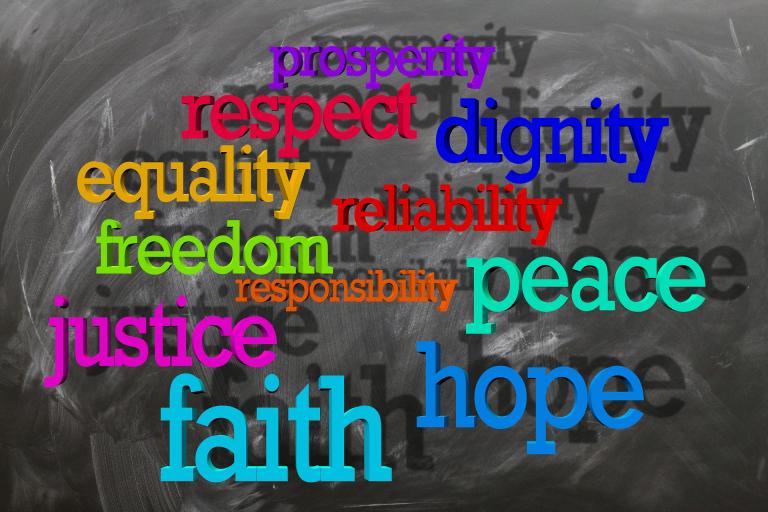Erin Wathen is on vacation this week. Her friend and colleague, the Rev. Kory Wilcoxson, senior pastor at Crestwood Christian Church in Lexington, Ky., is today’s guest blogger.
By Kory Wilcoxson
Two young fish are swimming along when they pass an old fish, who waves to them, smiles, and says, “Hey, boys! How’s the water today?” The two young fish just smile and wave back. Once they are out of earshot, one young fish turns to the other and says, “What’s water?”
For most of my life, that’s what it has felt like to be a white man.

I never thought about the characteristics that defined me, because they didn’t define me. They didn’t need to. I was no different than the majority of people around me, so I took who I was for granted, assuming everyone knew what it was like to be me. I acted like the other white men around me, emulating their interests, their language and their worldview. I never really thought about what it was like to be anyone other than who I was.
I now know that’s a problem.
Thanks (and I mean that sincerely) to recent revolutionary movements like Black Lives Matter and #MeToo, I’ve become acutely aware of the fact that I’m a white man and what that means for me and for those around me. I recognize that people like me (and me, if I’m honest) have used the power and influence of who we are in unknowingly subtle and overtly destructive ways to put down, disparage and oppress people not like us. As deep-rooted as this perspective and these behaviors are, the last thing I want to do is perpetuate this problem.
But I don’t know how to make things better without making things worse.
I was recently in a ministers’ meeting led by an African-American woman. Most of us in the room were white men, but there were also several women present (if you have to ask if the women were also ministers, you’re probably reading the wrong blog). During the Q&A session, the first several people to speak up were white men (including one who acknowledged this fact, and then went right on speaking). I saw a woman raising her hand to contribute to the conversation, but the guys were jumping in first with no regard for her or the increasingly uncomfortable dynamic they were creating.
I felt it, so I recognized an opportunity to do something. But what? I laid out my options and their consequences in my head:
- I could raise my hand, wait until I was called on, and say, “I would like to hear what some of the women have to say on this issue.” But the white men weren’t respecters of hand-raising, and by doing this, I would be yet another white guy in a long line of white guys who’ve already spoken. So, I trashed that one.
- I could fight fire with fire by interrupting the current white man speaking and saying, “Excuse me, but someone else is trying to say something. Let’s hear from her.” But knowing the woman who was trying to speak, I was well aware that she didn’t need me to be the valiant knight riding in to save the day and create space for her. So, I nixed that idea.
- I could stay silent. Yep, that works. That way, I don’t make anyone mad. And, besides, this isn’t my fight.
But I realized later that this damn well better be my fight, because if I don’t do something to help facilitate change, this paternalistic world will keep on spinning and creeps like Harvey Weinstein will think it’s OK to do what they’ve done. I need to call BS on the subtle racist and sexist attitudes that have shaped my upbringing. I need to use who I am to help make this world the kind of place where my two daughters can raise their hands and speak their minds without some blowhard interrupting them or calling them “Sweetie.”
Here’s my dilemma: How do I make things better without making things worse? How do I raise my voice in support without being yet another white man grabbing the mic? When do I speak up and when do I stay silent? Knowing me, I’ll choose wrong every time. So, I feel stuck. Now, please, before you start typing that sternly worded email, I’m not looking for pity. Being stuck in my white maleness hardly constitutes a problem, and so many others have dealt with so much more.

I’m not looking for sympathy; I’m looking for answers. So, until someone writes a book called “The White Man’s Guide to Not Being a Jerk,” here’s what I plan to do.
Be aware. I think that’s a big part of the problem. So often, I speak without considering the context because that’s not something I’ve ever had to do. I need to be more sensitive to the other voices in the room to make sure they are being heard.
Shut up. I’m a preacher. I like to talk. A lot. Because, you know, what I have to say is important. And you need to hear it so you’ll like me more. Time to erase that mindset and realize that my contribution to the conversation should be balanced by what others have to say.
Step outside my skin. I have no idea what it’s like to be a woman. Or African-American. Or gay. I have a lot to learn. And the best way to learn about who someone is and what they experience is to ask them. I had coffee last week with a new friend, an African-American woman who heads a non-profit organization. Her stories of racism and sexism were jaw-dropping to me. “You mean, people actually treat you like that?” “Oh, you have no idea.” I didn’t, but I do now.
Those are starting places, yet I still feel the frustration and fear of doing the wrong thing. But my fear of embarrassment is far outweighed by the fears experienced by those not like me. So, the worst thing I can do is not the wrong thing; it’s nothing at all. Do you have suggestions on what I can do? I promise I’m listening. I hope other white men are, as well.
+++
Kory Wilcoxson is honored to serve as senior pastor of Crestwood Christian Church in Lexington, Ky. When not hanging with his wife, Leigh, and two daughters, Sydney and Molly, he’s usually reading, watching movies, or golfing.












